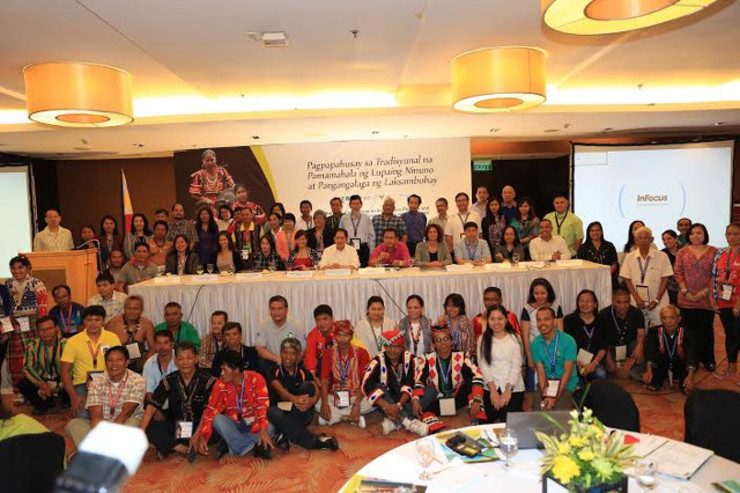SUMMARY
This is AI generated summarization, which may have errors. For context, always refer to the full article.

MANILA, Philippines – Philippine indigenous peoples want a bill that will strengthen their rights to conserve and protect natural resources inside their ancestral domains.
On the second day of the National Conference on Indigenous Communities Conserved Areas on Wednesday, October 22, tribal leaders applauded plans for such a bill to be sponsored by Ifugao representative Teddy Baguilat Jr.
“The bill will see to it that indigenous initiatives, indigenous systems in conservation will be strengthened and will be given a legal face, especially because many people still do not understand the ways of the IPs,” said Datu Migketay Saway of the Talaandig tribe in Bukidnon, Mindanao.
Some 85 tribal leaders attended the two-day event, representing 39 indigenous groups.
The so-called Indigenous Communities Conserved Areas (ICCA) bill is said to strengthen the Indigenous Peoples Right Act (IPRA) of 1997, the law that first recognized the rights of IPs to their ancestral domains, the preservation of their indigenous practices, knowledge systems and way of life.
But the IPRA, though revolutionary, does not address new concerns of IPs, especially with regards to the protection of ecologically-important areas within their ancestral domains.
“The IPRA does not really detail the environmental responsibility and the indigenous methods of conservation,” Saway told Rappler in a mix of English and Filipino.
Different dynamics
The closest the IPRA gets to mentioning conservation by the IPs is the list of responsibilities given to the IPs with CADTs.
According to the IPRA, IPs must maintain a balanced ecology in their domain by “protecting flora and fauna, watersheds and other reserves.” They are also tasked with restoring denuded areas through reforestation.
But it does not explain measures to be taken when an ancestral domain overlaps with a protected area declared by the Philippine government through the National Integrated Protected Areas System (NIPAS) Act of 1992.
Around 75% of the country’s 228 key biodiversity areas are within ancestral domains.
Protection under NIPAS entails different dynamics and mechanism from protection of an ICCA, said Baguilat.
“When you say protected area, the conventional definition is people are not allowed inside, houses are not allowed inside. The state is the one that protects, owns and manages the resources within. With ICCA, it’s the opposite. There are people there, there’s a community and its resources are owned or managed by the IPs. So that entails a different mechanism,” said the lawmaker.
But with or without the ICCA law, some IPs, with the help of government, are already harmonizing their traditional conservation methods with the NIPAS Act.
Culture, conservation
Still, an ICCA Act would put IP conservation methods on the same level as government methods already formalized in a law.
It would also introduce a new dimension to environmental conservation: its intimate association with the cultural practices, traditions and belief systems that define IPs.
“The dialogue about ICCAs goes much deeper because it mentions the relationship of the entire way of life of the IP in relation to the integrity of the natural environment,” said Saway.
Concretely, this means the law will respect, not only ICCAs, but the methods by which IPs protect and conserve them, which are so closely associated with their indigenous beliefs.
Not all these methods are understood, much less recognized, by non-IPs. For instance, conservationists from the academe would stop the cutting of a certain part of a forest because of its importance to biodiversity and ecological balance.
But the IPs would prohibit it for another reason: that spirits in that part of the forest will be angered. Their conservation methods would then include rituals to appease spirits or keep them happy.
Other IPs say an ICCA law would give the kind of protection from natural resource exploitation that the IPRA cannot.
“The ICCA law has a more impressive ring to it than just the IPRA law because it involves the participation of the DENR and will call the attention of the environmental movement, not just groups advocating for IP rights,” said Apo Edwardo Banda of the Ubu Manobo tribe in North Cotabato.
The law would ensure protection at least of forests and water bodies ahead of formal recognition of the entire ancestral domain in the form of a Certificate of Ancestral Domain Title (CADT). Applying for and getting CADTs has become a long, arduous and frustrating process for some IPs.
The ICCA law may help hasten the process of recognizing IP jurisdiction over, at the very least, ecologically-important areas which are often also the IPs’ sacred sites.
Sacred to nature and IPs
DENR Undersecretary Demetrio Ignacio said the bill is “something that we are not going to object to.”
Protection of a protected area and protection of an ICCA “overlap but are not totally the same,” entailing a different policy.
“In ICCAs, the protection also includes protection of sacred sites that is not in the NIPAS law,” he said.
Sacred sites include the protection of burial grounds and sites used for rituals.
Baguilat aims to file the bill within the year “for it to have a decent chance to pass,” he told Rappler.
But the draft would have to come from the IPs themselves, he said. The tribal leaders during the conference already agreed to pass a resolution asking Congress to pass the ICCA bill. A committee of all stakeholders has to be formed so the drafting can begin. – Rappler.com
Add a comment
How does this make you feel?
There are no comments yet. Add your comment to start the conversation.